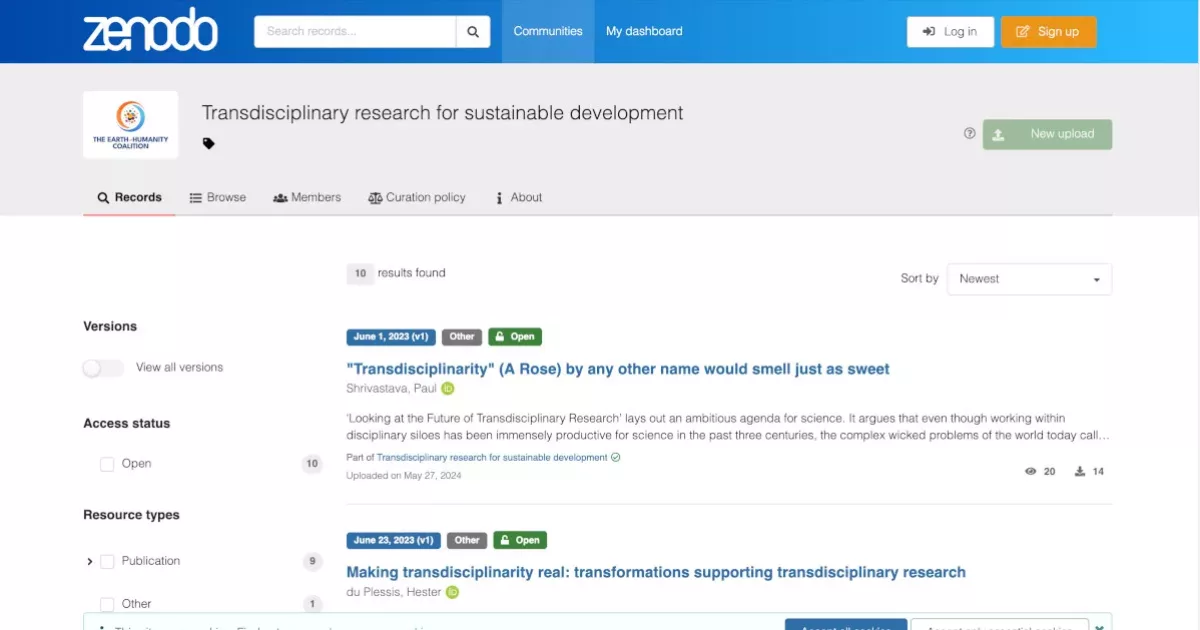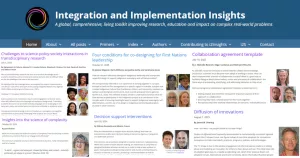The Earth-Humanity Commons: Sharing All Knowledge for Sustainability
EHC develops a global repository to revolutionize access to sustainable development research, based on a global open platform

A groundbreaking initiative by the Earth-Humanity Coalition is underway to establish a global online repository specifically dedicated to transdisciplinary research for sustainable development : EHC Commons. Leveraging the existing Zenodo platform, this project aims to overcome significant barriers currently faced by researchers and practitioners alike, fostering a more connected and equitable global community working towards sustainable solutions. The proposal outlines a vision for a collaborative, open-access hub for diverse digital artifacts related to this critical field.
The core problem the repository seeks to address stems from the nature of transdisciplinary research for sustainable development itself. Unlike traditional academic disciplines, transdisciplinarity usually involves actors from outside academia. This diverse community faces several challenges when it comes to accessing and disseminating knowledge.
Exploring and sharing
Exploring relevant literature can be difficult. While tools like Google Scholar are free, they lack curation, and curated databases like Web of Science and Scopus are expensive and restricted to subscribers. Moreover, they are primarily covering mainstream English literature. Access to published research is also limited, with only a fraction of academic journals generally accessible.
Considering publication, actors from low income countries, and actors outside academia often cannot afford open access publication fees, or lack access to specialized repositories that could provide visibility. This leads to inefficient and scattered research efforts.
In response to these challenges, The Earth-Humanity Coalition proposes to develop a global repository based on the open platform Zenodo. This aligns with the International Decade of Sciences for Sustainable Development (2024 – 2033), which aims to transform sciences and societies under the auspices of UNESCO.
Zenodo characteristics
Operated and enhanced by CERN, Zenodo was launched in 2013 and has grown significantly, serving today 400,000 users from 9,000 organizations in 161 countries. It is the largest general-purpose repository in the world. Zenodo can accommodate any kind of digital object, referred to as an “artifact,” regardless of file format. Crucially, Zenodo is free to search, and data can be curated in dedicated collections. The platform has been funded by various bodies, including initial EU funding, contributions from the National Institute of Health (US), Sloan Foundation, Arcadia Foundation, and CERN is covering operational costs.
While material can be access protected when needed, the general idea is to make results available open access. Anyone can submit research artifacts to the platform. This capability directly addresses the identified issues. On one hand, it enables anybody to explore the literature (through free search and curated collections) and access published content (by encouraging open access submissions). On the other hand, publishing results, whether they are written articles, videos, data sheets, slides, etc., is also addressed, as anyone can submit artifacts, and special collections curated by the transdisciplinarity for sustainability community will ensure relevance and quality.
Transdisciplinary by construction
The proposed repository embodies in itself several key transdisciplinary aspects. Firstly, its fundamental purpose is to be a repository specifically dedicated to data related to transdisciplinarity for sustainable development. Secondly, it will accept any kind of data in digital format, not being limited solely to scientific articles, thus facilitating use by non-scientists. Finally, a co-constructed approach is at the very root of the project: the global shape is defined by Zenodo structure, but the details and the structure of the “Transdisciplinarity for sustainable development” part of Zenodo will be co-constructed with diverse users, including scientists, non-scientists involved in sustainability projects, funders, and policy makers.
The project is designed to further equitable solutions for sustainability. It proposes constructing a community where each ‘node’ operates autonomously, adhering to common guidelines defined by a board of moderators. All collected information will be searchable, allowing exploration across all nodes via a specific interface. Being dedicated to sustainability and fully open access, the repository ensures that anyone with an internet connection can post, search, and download content. Furthermore, the platform is envisioned as a network where communities, from local to worldwide, can manage their own data using their own language, concepts, topics, and link them to the global network. This structure aims to facilitate the practice of epistemic justice at a global scale. The initiative seeks to sustain the commons character of all knowledge in a fair and equitable way.
Developping plan
The plan for building this community and platform involves several stages over multiple years. First, the “Bootstrap” phase will focus on preparing the technical infrastructure on Zenodo, engaging early adopters, establishing editorial boards and policies, identifying next onboarders, and initiating dissemination and communication efforts through various channels. This is being advanced tanks to a memorandum of understanding signed between EHC and the Belmont Forum, and to a presentation at the Sustanability Research and Innovation 2025 congress.
Then, the “Scale” phase, involves developing a sustainability plan with diversified future funding sources, building capacity, implementing the scaling and adaptability plans (pilot-to-scale model), fostering community ownership, monitoring and evaluating progress through tracking impact metrics and using data and testimonials to demonstrate demand, onboarding new communities, and continuing dissemination. Following, the “Transition” phase, will review policies and structure, transition to a sustainable phase, and continue dissemination and communication efforts. On the long term, the vision is for EHC to carry the initiative forward, with distributed hosting of artifacts across territories and a common use and search engine in place.
A project with an impact
The anticipated results and specific impacts of this global repository are significant. First, it will connect the scattered transdisciplinary communities focused on sustainable development, enabling to create wider communities and engaging newcomers in the field, be they professional scientistst, association responsibles or local authorities. The repository is intended to tie this communities closer together.
The platform will facilitate the use by non-scientists as it is not limited to scientific articles. Curation of the content, as well as the envisonned production of summaries accessible to all, with the help of artificial intelligence, will help involve all kind of participants. It will also tackle the barrier where actors outside of Academia often do not have access to specialized repositories offering visibility.
It will also promote epistemic justice at a global scale, as communities will be free to access EHC Commons and to curate their own content related to sustanable development.
Resources needed
While the project holds great promise, conditions and barriers exist. Curation will be implemented by people: we still need to find them, who would like to be involved in the project, tapping into relevant networks.
Funds are also needed, to help with the coordination and, if possible with curation at some level.
Jens Vigen and Luc Allemand
SUBSCRIBE TO OUR NEWSLETTER
To stay up to date with our projects and the development of the EHC
Read more articles

WAAS Talks on Science for Human Security: Renewable Energy
On 23rd February 2026, an expert panel will discuss renewable energy as part of the EHC-WAAS program of sciences for

Gian Francesco Giudice: “Ethical responsibility is essential in fundamental research”
From hypothetical black holes to environmental impact studies, CERN navigates risk, transparency, and moral responsibility at the frontiers of human

Dealing with the complexity of society and environment
A global toolkit for tackling complex problems with more than 600 different methods Ever wish you had a free toolkit

The Moon & the Global South: Voices, Risks & Promise
Researchers warn that without inclusive governance, the Moon could become “a new arena for old patterns of exclusion” When rockets